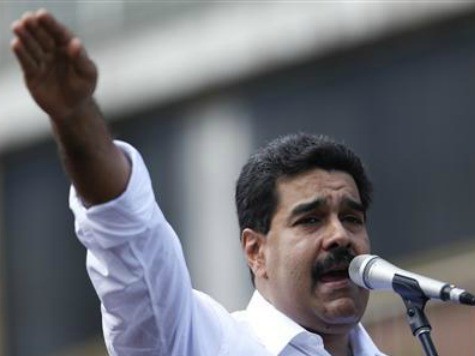
Questionably legitimate Venezuelan President Nicolás Maduro geared up last week to announce an officially plummeting crime rate in the deadly capital of Caracas. Suspiciously, that announcement coincided with a demand for an injunction to prevent a major newspaper from reporting on crime.
Caracas flagship paper El Universal published a story this week detailing the Venezuelan judiciary’s attempt to crack down on its crime coverage. The controversy arose from a story published in November with the gory image of police investigating a crime scene, a dead man’s arm visible in a pool of blood (graphic image here). The government accuses El Universal of “generating instability in the Venezuelan population” and “violating the rights of children” who might see the newspaper. The government thus wants a ban on crime coverage and a multi-million-bolívar fine that would fall somewhere in between 1-2% of the newspapers total annual sales.
The injunction would prohibit the coverage of “blood, weapons, terror messages, physical aggression, images that contain war images and messages about death and the deceased that could alter the psychological wellbeing of children.”
Many of the Venezuelan government’s opponents view this as an unconstitutional crackdown on freedom of the press in that country, a highly precedented move for a regime that has established itself as one of the most brutal against opposition journalists. Spanish newspaper El Pais notes that this is not the first time Maduro’s government has tried to censor coverage of crime, going after several other newspapers for publishing images of the piling bodies in Caracas’s morgue to highlight the government surging crime problem.
And they have every good reason to adamantly continue reporting on the city’s crime. Caracas is the “murder capital of the world,” with more than 55 murders for every 100,000 residents that is flooded with illegal weapons and gangs. The situation was so dire earlier this year that Maduro had to send the military into Caracas to fight garden variety criminals, used to having to kill to steal or commit what would be lesser crimes in other regions.
In a few Venezuela regions, crime has reached such astronomical levels that some have turned to praying to dead thugs, hoping that they could reason with criminals better than a saint could. Maduro intended such a move to make his image that of a crime fighter and reformer of urban areas, though Maduro himself has encouraged mass lootings of small businesses in his speeches as a way to fight imperialist oppression.
Venezuela is set to announce at the end of the year that the murder rate has fallen from the aforementioned 55 per 100,000 people to 39–still a gigantic number for such a heinous crime, but arguably much better. That number, Reuters notes, is heavily in dispute, however. Some NGOs have cited the real crime rate as high as 73 per 100,000 residents, which the government routinely argues is due to miscalculations in morgues propagated by an opposition fueled by United States interests.
Perhaps some would have been willing to believe the good news coming out of the Venezuelan government’s propaganda ministry if it had let the press challenge it. But there is little coincidence in this simultaneous announcement of good news and crackdown on crime coverage. If crime is dropping as quickly as the government claims, would they need to ban the press from reporting it?
The way they tell the story in international circles, there would not be much to report by the end of the year, anyway. And yet they persist in being the only voices with statistics and eyewitness reports on what it is like to live in Maduro’s Venezuela, an extension of Hugo Chávez’s strongman reign that has managed an image even more brutal and dire.

COMMENTS
Please let us know if you're having issues with commenting.